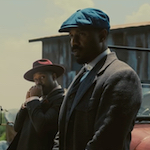 SINNERS is the first original story from writer/director Ryan Coogler. Not that it matters. After the true story of FRUITVALE STATION he added to fictional worlds and characters created by other people – CREED, BLACK PANTHER and BLACK PANTHER: WAKANDA FOREVER – but he sure seemed like a visionary to me. Working in such worn-out modern formats as “the legacy sequel” and “the MCU” didn’t stop him from constructing crowd-pleasing but deeply personal movies that transcend those categories.
SINNERS is the first original story from writer/director Ryan Coogler. Not that it matters. After the true story of FRUITVALE STATION he added to fictional worlds and characters created by other people – CREED, BLACK PANTHER and BLACK PANTHER: WAKANDA FOREVER – but he sure seemed like a visionary to me. Working in such worn-out modern formats as “the legacy sequel” and “the MCU” didn’t stop him from constructing crowd-pleasing but deeply personal movies that transcend those categories.
So shit yeah I was excited for him to do a vampire movie. Say no more.
It’s set in the Mississippi Delta, 1932. After some years of infamy working for Al Capone in Chicago, “the Smokestack Twins,” Elijah “Smoke” Moore and Elias “Stack” Moore have returned to their home town of Clarksdale. Both are played by Michael B. Jordan (WITHOUT REMORSE), and they’re introduced passing a cigarette back and forth. Later one tosses his knife for the other to stab a rattlesnake through the throat with. After that they’re often separated, but the illusion has been established seamlessly.
I like that it takes its time getting to the vampires, instead making me really invested in the twins’ plan to set up a new juke joint (with the generic name “The Juke”) in one day. They buy an old saw mill from a very iffy white man (David Maldonado, CAT RUN 2), then split up and go around to people with the resources and talents they need, friends from way back who seem a little bitter or suspicious and hesitate before they see how much it pays but still seem to love them. Family, basically. Cornbread (Omar Benson Miller, HOMEFRONT), for example, just wants to stay picking cotton on the field he share crops, but seems very happy once he’s there watching the door. (read the rest of this shit…)

 A couple months ago I got on a Jean-Michel Basquiat kick. You probly know who that is, but if not, he was a New York City graffiti artist in the early hip hop era, transferred his skills to paintings for galleries, became rich and famous and friends with Andy Warhol and stuff in a brief, prolific life before (like so many bright lights) dying of a drug overdose at 27.
A couple months ago I got on a Jean-Michel Basquiat kick. You probly know who that is, but if not, he was a New York City graffiti artist in the early hip hop era, transferred his skills to paintings for galleries, became rich and famous and friends with Andy Warhol and stuff in a brief, prolific life before (like so many bright lights) dying of a drug overdose at 27. NEPTUNE FROST is a new sci-fi movie, though not the type anybody would picture when I say that word. It takes place in what must be the near future, with technology and civilization extrapolated from and commenting on the present. It has world-building, colorfully named characters (Memory, Innocent, Psychology), futuristic lingo, a rebellion. But it’s very much an art movie, its imagery more based in theater and video art than FX, and also it’s a musical. Its story is more mythical, surreal and allegorical than traditionally cinematic. The narrator, Neptune, acknowledges this upfront when she says, “Maybe you’re asking yourself WTF is this? Is it a poet’s idea of a dream?” So it’s not surprising that its growing cult success has come through a carefully coordinated limited release.
NEPTUNE FROST is a new sci-fi movie, though not the type anybody would picture when I say that word. It takes place in what must be the near future, with technology and civilization extrapolated from and commenting on the present. It has world-building, colorfully named characters (Memory, Innocent, Psychology), futuristic lingo, a rebellion. But it’s very much an art movie, its imagery more based in theater and video art than FX, and also it’s a musical. Its story is more mythical, surreal and allegorical than traditionally cinematic. The narrator, Neptune, acknowledges this upfront when she says, “Maybe you’re asking yourself WTF is this? Is it a poet’s idea of a dream?” So it’s not surprising that its growing cult success has come through a carefully coordinated limited release.























